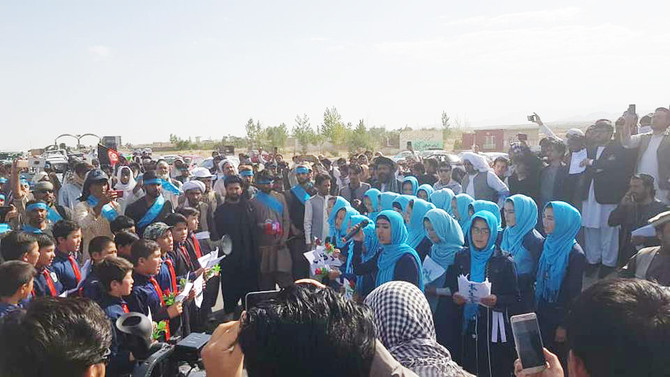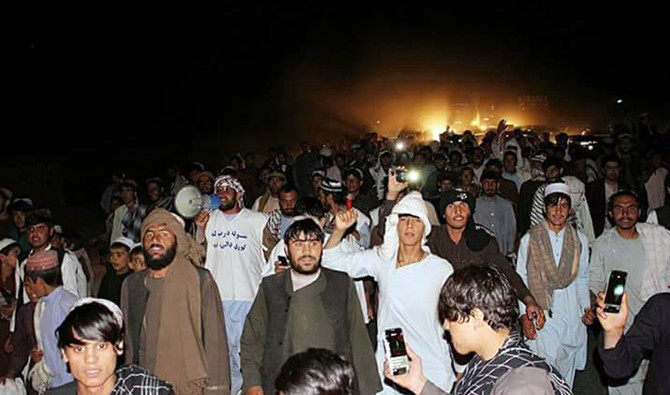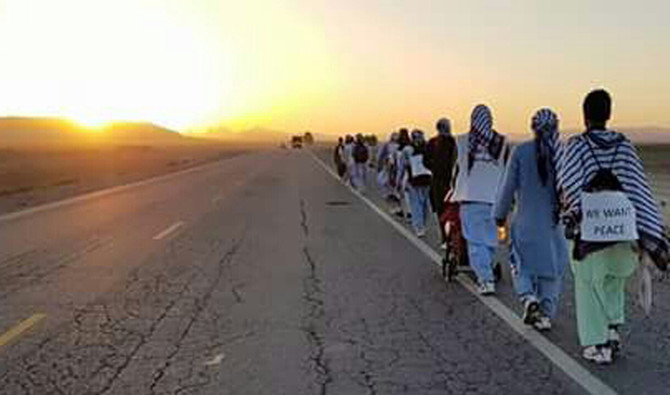KABUL: Under blistering sun, a group of fasting Afghans has been marching for peace for nearly a month, mobilizing people in villages and towns.
The “Convoy of Peace” was conceived in March by villagers in southern Helmand province, after more than a dozen people were killed when an explosives-laden vehicle went off during a wrestling match as part of Afghan new-year celebrations.
The villagers walked for nearly 200 km to talk with government commanders and Taliban members to agree to a truce.
When their message fell on deaf ears, they set up a sit-in tent, then began a nationwide march at the start of Ramadan.
Braving the heat and attacks, the group has marched from Helmand to the adjacent provinces of Kandahar, Zabul and Ghazni.
The route is part of a Taliban stronghold, and witnesses routine clashes between it and US-backed Afghan forces.
The marchers “have been welcomed by villagers who give them food, shelter and medical care,” Roozi Mohammad Zabuli, a coordinator of civil society groups in Zabul, told Arab News.
“They’re telling the people that peace is in the hands of ordinary people, and that they can achieve it by putting pressure on the warring sides. People are exhausted here and thirsty for peace, and have hailed the initiative.”
The march began with seven people but now includes 50. One is a sports champion, another has a master’s degree, and two are physically disabled.
Sardar Mohammad re-joined the march after leaving to attend the funeral of his brother, who was killed in an attack in Kandahar. Most of the marchers have lost at least one family member to the war.
Hamidullah Tokhi, a lawmaker from Zabul, said the group prefers to avoid engaging with local authorities because it does not want to be seen to be favoring one side.
“It’s a big initiative. People are happy. You’ll see a gradual but concrete impact on the minds of people that they have to take charge of their own destiny rather than wait for others to bring them peace,” he told Arab News.
“We can call it the start of a revolution. Revolutions always begin with a small number of people and ambitious goals. They have the determination and will to work for peace.”
Government officials and the Taliban endorse the march, saying they will support any move than can bring security to Afghanistan.
The marchers plan to head to Kabul to pass on a proposal to the government, the UN and the US-led coalition for a cease-fire, the establishment of an Islamic government that includes the Taliban, and a timetable for the withdrawal of foreign forces.
“If the two sides don’t accept our demands, we’ll go to other provinces and tell people to join us and mount pressure on who’s at fault,” Iqbal Khaibar, an organizer of the march, told Arab News.
In Kabul, “we’ll be telling the international community humbly: ‘We’re human just like you. All our mothers are mourning here every day. Do your mothers and your blood differ from ours? Let us have peace’,” he added.
Zabuli said: “When there’s national pressure, foreign troops will pull out. We just need to give people the mentality that they have to stand and take charge of their lives and stop the war.”
Khaibar said: “The Taliban says foreign troops should leave then it’ll talk with the government, while foreign troops say there should be peace then they’ll leave. We have to find a solution to this, and that’s exactly what the marchers are after.”





























